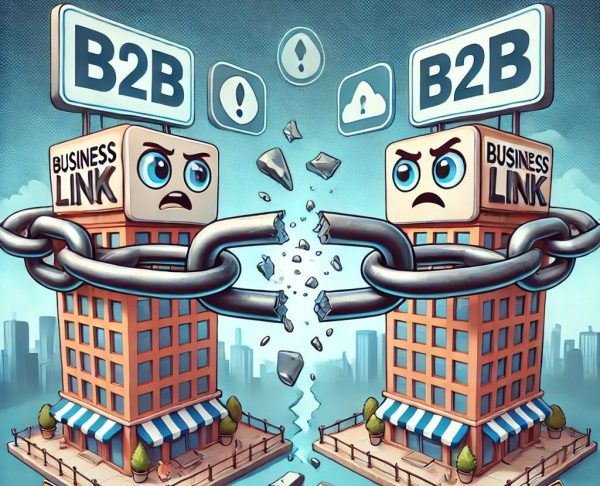We will discuss the influence of B2B link-building on SEO and relationship-building and offer guidance on crafting a successful link-building strategy. The strategies are irreplaceable in improving a business’s digital presence and credibility in the online domain through the implementation of practical link-building tactics.
B2B Link-Building

What is B2B Link-Building?
B2B Link-Building is the process of acquiring high-quality backlinks from other businesses to improve a website’s search engine optimization (SEO) performance and promote its domain authority.
The obtained backlinks from reputable sources within the same industry improve a business’s online presence and visibility among its target audience. When other websites link back to your website, it signifies a vote of confidence in the eyes of search engines, indicating that your content is trustworthy and pertinent. B2B Link-Building impacts a website’s search engine rankings and overall visibility, serving as a potent tool for attracting organic traffic and potential leads to a business.
Why is B2B Link-Building Important?
B2B Link-Building is important because it assists in the drive of organic traffic to websites and advances search engine rankings through the use of high-quality backlinks and relevant keywords in content.
How Does B2B Link-Building Help in SEO?
When reputable websites link to a website, they endorse the content on the linked page as valuable. Such backlinks affect domain authority and signal to search engines that the website is a trustworthy source.
Placing external backlinks on anchor text relevant to the linked page’s content improves the visibility of the linked keywords. Moreover, B2B link-building shows that the linked-to sites are within the same industry or niche, improving a website’s SEO ranking and providing users with valuable resources related to their search.
How Does B2B Link-Building Help in Building Relationships?
B2B Link-Building focuses on relationship-building through outreach and networking to establish partnerships and collaborations with other businesses. Outreach campaigns serve as a means for companies to engage with potential partners and industry influencers, creating brand exposure and expansion opportunities. Networking events, both online and offline, offer a platform for sharing expertise, exchanging ideas, and building trust. Partnerships forged through the interactions are integral to link-building strategies that boost domain authority and visibility on search engines. Collaborations in content creation and cross-promotion contribute to marketing efforts, fostering increased customer engagement and lead generation.

How to Create a B2B Link-Building Strategy?
To develop a successful B2B Link-Building strategy,
- Finding your target audience,
- analyzing competitors,
- selecting platforms for building backlinks,
- creating high-quality content, and
- contacting link partners.
1. Identify Your Target Audience
- The first step in creating a B2B Link-Building strategy is identifying your target audience. It allows you to tailor your SEO and content marketing approaches to attract the right businesses.
- Know your audience’s needs, preferences, and pain points to build links.
- Knowing your target audience allows you to develop content that resonates with them, increasing the likelihood of engagement and content sharing.
- Market research, including demographic, behavioral, and interest analysis, is valuable for identifying your target audience.
- Tools such as Google Analytics provide insights into the types of businesses visiting your site, allowing you to adjust your link-building strategies to better suit their needs.
2. Research and Analyze Your Competitors
Research and analysis of competitors will provide you with valuable insights into their backlink profiles, which affects your SEO performance and strategy.
!!To do it:
Gather information about the websites linking to them and the quality of backlinks. The data is easily accessed through tools such as Ahrefs, SEMrush, and Moz. The tools will identify your competitors’ referring domains, anchor text distribution, and top-linked pages.
Armed with the information, you may identify potential backlink opportunities for your own website.
3. Choose the Right Platforms for Link-Building
The effectiveness of link-building techniques and the proper usage of link-building tools depend on choosing the right platforms. Different platforms cater to various aspects of B2B link-building.
LinkedIn, a professional network, is ideal for industry connections and sharing high-value content.
HARO (Help a Reporter Out) connects journalists with expert sources, offering an opportunity to secure links on high-authority publication sites. Reddit is beneficial for content promotion, particularly in industry-related niches.
Tools such as Ahrefs or SEMrush analyze backlink profiles, discover link-building opportunities, and monitor competitors’ link-building strategies for the successful implementation of a B2B link-building campaign.
4. Create High-Quality Content
Produce high-quality content that will attract backlinks and, when coupled with SEO best practices, improve search engine rankings. High-quality content is relevant and engaging for its target audience, offering valuable insights or solutions to their requirements.
Top-notch content in today’s saturated online content presents a unique perspective or fresh information on a subject. In content marketing, the emphasis is not solely on content creation; strategic content promotion leads to organic backlinks.
Businesses establish industry authority and attract valuable inbound links by leveraging well-researched and well-crafted high-quality content. Adhering to SEO best practices, such as incorporating relevant keywords, optimizing meta tags, and presenting easily digestible content, further improves the content’s visibility and impact.
5. Reach Out to Potential Link Partners
Engaging with potential link partners is a component of B2B Link-Building, which requires structured outreach campaigns and relationship development. Outreach campaigns must be personalized as much as possible to connect with the target audience effectively.
When cultivating relationships with potential link partners, the focus should be on fostering genuine connections rather than merely transactional exchanges. Engage in meaningful discussions, provide value, and build trust and credibility by showcasing your expertise. Successful link-building goes beyond acquiring backlinks and requires establishing stable partnerships.

What are the Best Practices for B2B Link-Building?
In B2B Link-Building, best practices include:
- Focusing on relevance and quality
- Utilizing guest posting
- Leveraging Social Media for Outreach
- Regularly checking your links
1. Focus on Relevance and Quality
In effective B2B Link-Building, both relevance and quality directly impact the SEO benefits and overall success of a link-building campaign. Relevance means linking to content closely aligned with your industry, services, or target audience. Quality backlinks originate from reputable sites with high domain authority and trustworthy content.
2. Utilize Guest Blogging
Guest blogging is a link-building technique in which a marketer writes guest posts on another website, leveraging the platform’s audience to distribute content and acquire high-quality backlinks.
The key is crafting high-quality, engaging, and valuable content that genuinely benefits the hosting website’s audience.
3. Use Social Media for Outreach
Utilize social media for outreach, develop link-building, and establish connections with potential link partners. Engage with potential link partners on social media by creating valuable and shareable content that appeals to their audience and initiating meaningful conversations on industry topics.
Twitter may be utilized to follow and engage with influencers and bloggers within your niche, while LinkedIn provides a professional platform to interact with industry professionals and thought leaders. Facebook groups offer a networking opportunity to share industry-related content, potentially leading to valuable link opportunities.
4. Monitor and Track Your Links
Regularly monitoring backlinks allows businesses to identify which websites are linking to their content, thereby assessing the quality and relevance of links.
!!Important:
Tracking the sources of backlinks will assist you in pinpointing any toxic backlinks that might harm your website’s SEO performance.
Tools such as Ahrefs, Moz, and SEMrush offer in-depth analysis of a website’s backlink profile, including metrics such as domain authority, anchor text distribution, and referring domains.

What are the Common Mistakes in B2B Link-Building?
!!Common mistakes in B2B Link-Building include prioritizing quantity over quality, neglecting link diversity, and using anchor text poorly. Find an SEO expert to quickly learn how to avoid the mistakes we will mention. Every mistake will cost you money and time to fix, remove, or even penalize you.
The button will redirect you to the Upwork freelance platform, where you can schedule 30-minute consultations for $30 or 1-hour consultations for $60.
1. Relying on Quantity over Quality
Focusing too much on the quantity of backlinks at the expense of quality is a common mistake that undermines your B2B Link-Building efforts and harms your business’s SEO performance. It highlights the importance of prioritizing quality backlinks over merely increasing the number of backlinks.
As per search engine algorithms, backlinks from authoritative and relevant sources influence your website’s authority and credibility. Conversely, low-quality links, such as from spammy or irrelevant websites, have a detrimental impact; the inferior links prompt search engines to penalize your website, leading to decreased organic traffic and rankings.
2. Ignoring Link Diversity
Neglecting link diversity restricts the effectiveness of your link-building strategies or campaigns and diminishes the impact of your overall SEO strategy. Link diversity is commonly addressed in the context of link profiles or link-building strategies.
To contribute to your link profile and demonstrate to search engines the website’s value and relevance, include a mix of backlink types such as guest posts, social bookmarks, directory submissions, and press releases.
3. Not Utilizing Anchor Texts Properly
Incorrect usage of anchor texts is a common mistake that diminishes link relevance and hinders the implementation of SEO best practices. Anchor texts provide context and information to both users and search engines.
It is important to avoid generic phrases or excessive repetition as they dilute the effectiveness of the anchor text.
Diversifying anchor texts and utilizing a mix of exact match, partial match, and branded anchor texts will create a well-rounded link profile.

Frequently Asked Questions
What is B2B Link-Building?
B2B Link-Building is the process of acquiring inbound links from other businesses and organizations to your own B2B website. It improves your website’s visibility and reputation and drives more targeted traffic to your site.
Why is B2B Link-Building important?
B2B Link-Building is important because it assists in establishing your business as a reputable and trustworthy source in your industry. It also improves your website’s search engine ranking, making it easier for potential customers to find you.
How does B2B Link-Building work?
B2B Link-Building: Identify and contact relevant businesses and organizations in your industry and ask them to link to your website. It is done through various methods, such as email outreach, guest blogging, and content partnerships.
What are the benefits of B2B Link-Building?
B2B Link-Building has several benefits, including increased website traffic, improved search engine ranking, and improved brand reputation. It also allows you to establish valuable connections and partnerships within your industry.
What are some effective B2B Link-Building strategies?
Effective B2B Link-Building strategies include creating high-quality, shareable content, leveraging relationships with industry influencers, utilizing social media for outreach, and participating in relevant online communities and forums.
How Do I measure the success of my B2B Link-Building efforts?
You measure the success of your B2B Link-Building efforts by tracking metrics such as website traffic, search engine ranking, and backlink profile. You may use tools such as Google Analytics and Moz to analyze the impact of your link-building activities.

